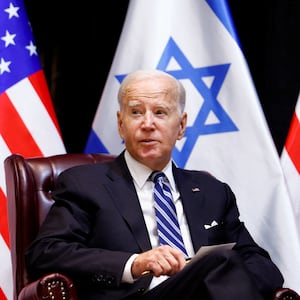The United States Embassy in Israel on Thursday said restrictions have been imposed on government employees and their families amid mounting fears of an imminent attack by Iran.
The security alert said staffers and their loved ones will be prohibited from all personal travel outside of the areas of greater Tel Aviv, Jerusalem, and Be’er Sheva “until further notice.” The update said the restrictions are being imposed “out of an abundance of caution.”
It did not specifically mention Iran, though Tehran has vowed to retaliate against what it described as an Israeli airstrike on an Iranian embassy complex in Syria on April 1. The attack in Damascus—for which the Israeli government has not claimed responsibility—killed 13 people including two Iranian generals and five officers.
“I’m not going to speak to the specific assessments that led to us to restrict our... employees and family members’ personal travel,” State Department Spokesperson Matthew Miller said at a press briefing. “But clearly we are monitoring the threat environment in the Middle East, and specifically in Israel.”
President Joe Biden warned earlier this week that Iran is “threatening to launch a significant attack on Israel” and affirmed that the U.S. commitment to protecting Israel’s security is “ironclad.”
He did not elaborate on when or what form the attack may take, but a subsequent report in The Wall Street Journal claimed that Israel is bracing for an Iranian attack in either the north or south of Israeli territory “as soon as Friday or Saturday,” a person familiar with the matter said.
Another source told the Journal that while Iran’s Supreme Leader Ayatollah Ali Khamenei had been briefed on several strike options, he has not yet taken a decision. A direct attack on Israeli soil could trigger a massive retaliation, with alternative options reportedly including an assault by Tehran’s proxies in Iraq and Syria, strikes in the Golan or Gaza, or even attacks on Israeli embassies internationally.
General Michael “Erik” Kurilla, commander of the U.S. Central Command responsible for the Middle East, was sent to Israel on Thursday to coordinate with the Israelis around the potential Iran attack, according to The New York Times. Unnamed officials also said that Kurilla would discuss the war against Hamas—a group supported by Iran—in Gaza and ongoing work bringing humanitarian aid into the enclave.
“We are in challenging times,” Israeli Prime Minister Benjamin Netanyahu said during a visit to Tel Nof Airbase in central Israel. “We are in the midst of the war in Gaza, which is continuing at full force, even as we are continuing our relentless efforts to return our hostages. However, we are also prepared for scenarios involving challenges in other sectors.”
Without explicitly mentioning the Iranian threat, Netanyahu then appeared to indicate that he is prepared to retaliate against any attack. “We have determined a simple rule: Whoever harms us, we will harm them,” he said. “We are prepared to meet all of the security needs of the State of Israel, both defensively and offensively.”
U.S. Secretary of Defense Lloyd Austin, meanwhile, was reportedly frustrated that the U.S. had not been given advance warning of the Damascus airstrike. According to The Washington Post, Pentagon officials viewed the strike as an escalation that increased risks to American troops deployed in the Middle East, with Austin and others believing that prior warning would have allowed the U.S. to shore up defenses to protect both Israel and American forces from a potential Iranian retaliation.
Austin complained to his Israeli counterpart, Yoav Gallant, during a call Thursday, according to the Post. The Pentagon’s readout from the call made no mention of such a complaint, saying instead that Austin reaffirmed Biden’s expressions of support “in the face of growing threats from Iran and its regional proxies.” “Secretary Austin assured Minister Gallant that Israel could count on full U.S. support to defend Israel against Iranian attacks, which Tehran has publicly threatened,” it added.







